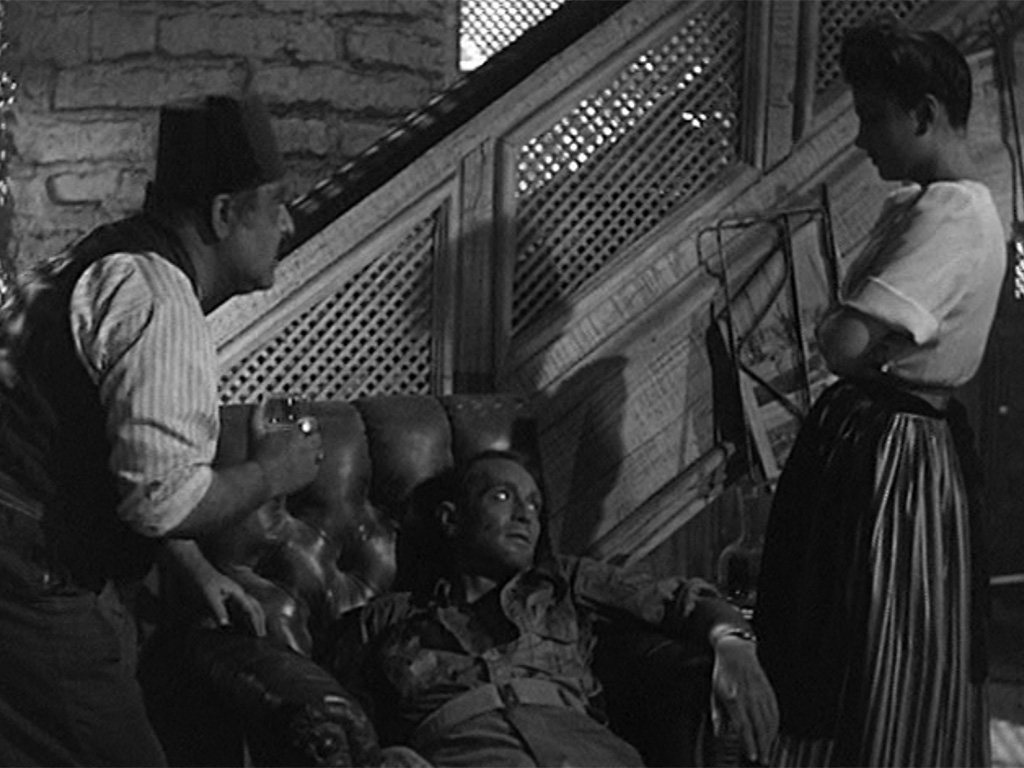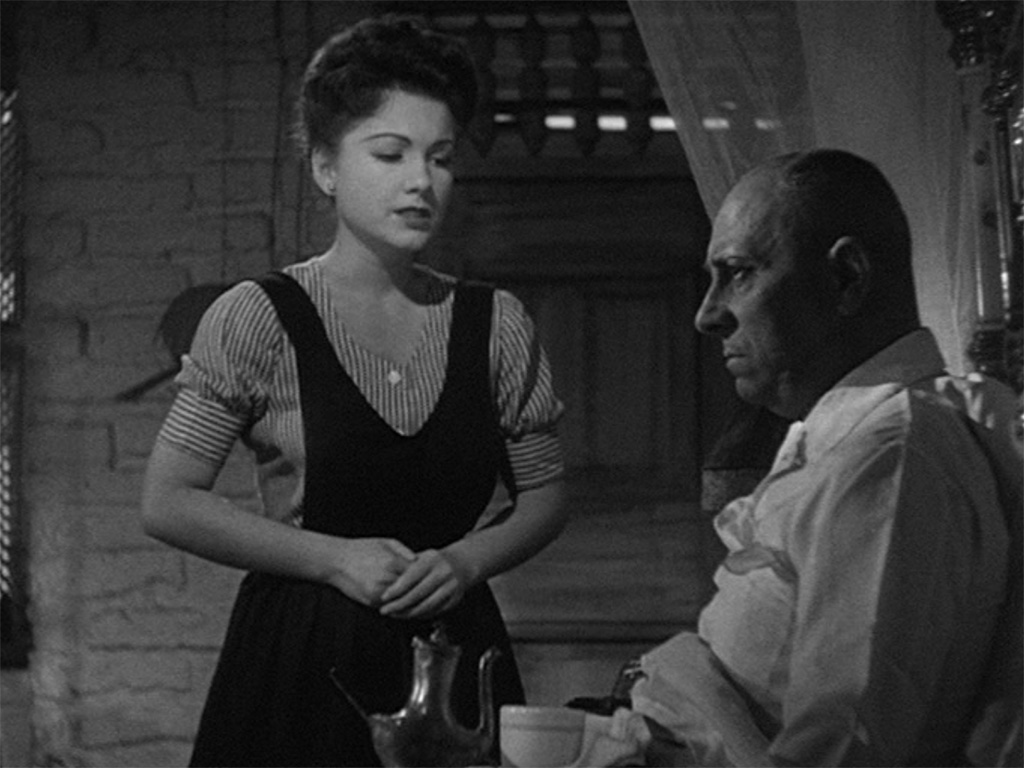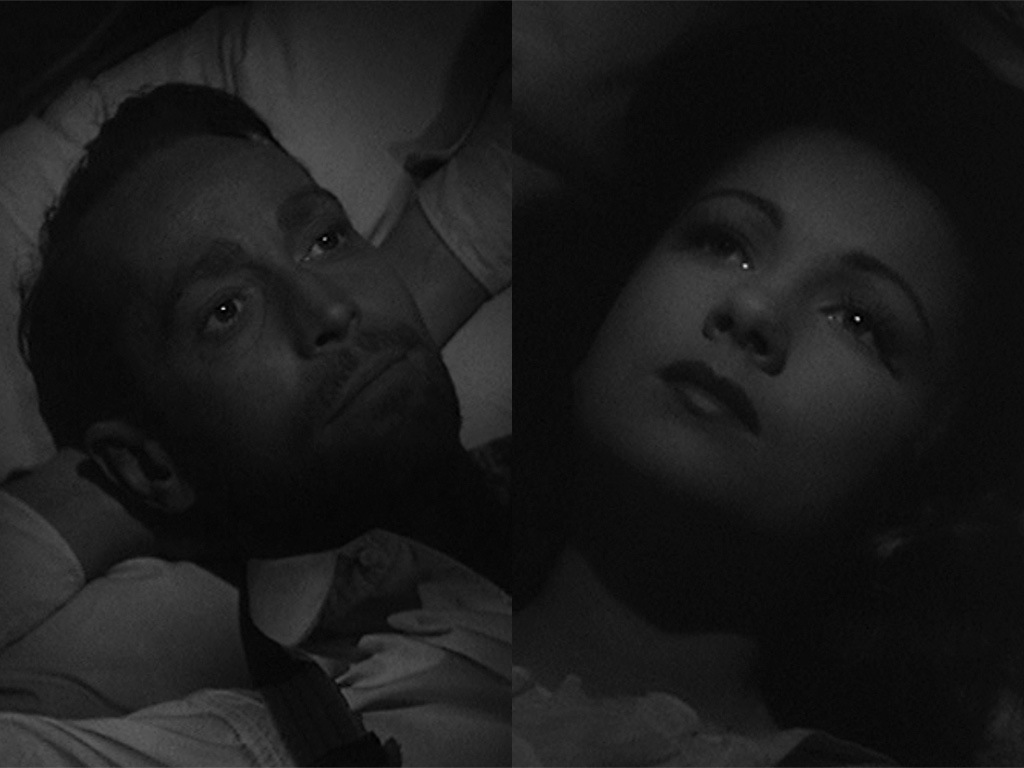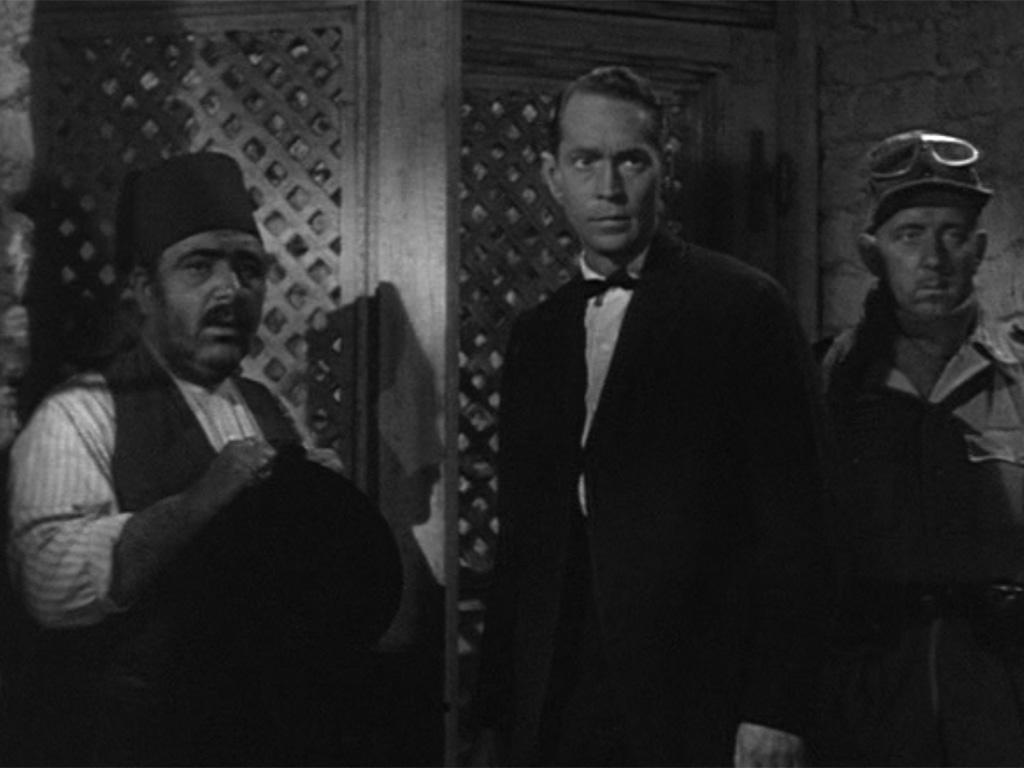| John Costello |

Five Graves to Cairo plays at the Trylon Cinema from Friday, June 7th, through Sunday, June 9th. Visit trylon.org for tickets and more information.
Despite the underlying wartime suspense and tragedy, Five Graves to Cairo (1943) gives the audience ample reason to laugh at the Nazis and their accomplices. The film deflates the legend of Nazi Field Marshal Erwin Rommel and constantly demeans his weak ally, the buffoon-like Fascist Italian General Sebastiano.
At one point, the opera-loving Sebastiano seems almost to realize he has picked the wrong side, asking about Germany, “Can a nation that belches understand a nation that sings?” By the end of the film, the joke will be on him.
So often does Five Graves to Cairo veer into comedy, I sometimes forgot I was watching a wartime spy thriller aimed at boosting support for the World War II Allied cause. Jokes, taunts, and physical humor pepper the viewer more often than war or spying. Set in Egypt in 1942, the film’s misdirections and confusions further the action and tragedy, along with the humor.
Take, for example, the chilling opening scene, in which a lone tank gambols across a series of sand dunes. Inside the tank, British Corporal J. J. Bramble awakens surrounded by billowing exhaust, a literal fog of war. He doesn’t stop the tank. He pratfalls from the turret, then staggers into a ruined town and bomb-damaged hotel, The Empress of Britain. Farid, the Egyptian hotel manager, and Mouche, the French maid, watch in silent confusion as Bramble delivers his mission report to wooden posts he mistakes for British officers. I’d have been laughing through the scene, if not for the fate of Bramble’s tank crew.
Then the Nazis arrive. Soon, they are joined by Rommel, famous as the “Desert Fox” leading the Nazi assault to claim North Africa from Casablanca to Cairo and the Suez Canal. Bramble manages to escape, thanks to Nazi incompetence and quick thinking by Farid.
In every scene, Rommel acts like a bullying, bragging, overconfident know-it-all who constantly swishes around a horsetail riding crop. He calls himself a magician and boasts about his foolproof scheme, even declaring which opera will be staged in Cairo to welcome his triumph. In one scene, he complains when Mouche serves his coffee, saying, “I don’t like women in the morning.” He then bullies her, demanding, “Two steps back, please,” before fussing about sand on his spoon (in the middle of the desert). When Mouche asks for Rommel’s help, he lectures her about bad melodramas. Later, accidentally spilling salt, Rommel superstitiously throws some over his shoulder. This, the film seems to ask, is a leader of armies?

By 1943, the audience knew about the 1942 British victory over Rommel. Making fun of Rommel and Sebastiano served the war effort, just as portraying the clever struggle to uncover Rommel’s plans did. Sebastiano earns the film’s wrath in part because Rommel’s defeat enabled Allied preparations in invading Italy, which would happen later in 1943.
While Bramble is the film’s hero, Mouche and Farid deserve consideration for how they are portrayed. The film focuses on the servants, although the war is never entirely out of mind. Initially, Farid protects Bramble and Mouche threatens to turn him over to the Nazis. Mouche, blaming Bramble and the British for what happened to her brothers during the tragic Allied retreat at the Battle of Dunkirk, represents a divided France. Like the collaboration government in Vichy, France, Mouche says she wants to “do business” with the Nazis, and like the French Resistance throughout occupied France, she detests the Nazis.

Meanwhile, Farid the Egyptian hotel manager constantly cowers. Why doesn’t Farid bargain, creating a three-way tension with Bramble and Mouche? Why doesn’t he act? It’s worth comparing Farid and Mouche to the original characters from the source for the structure of Five Graves to Cairo, a 1917 play known in English as Hotel Imperial and adapted as a silent movie in 1927. In the earlier film version, Elias, Anna and Almaty—the three of them filling roles similar to Farid, Mouche, and Bramble—work together. Anna agrees to some of the enemy general’s advances only as a way to save Almaty. Elias behaves hospitably in front of the enemy soldiers and rages at their backs after they leave. He actively schemes with Anna and Almaty to stop an enemy spy. In one scene, Elias confronts the hotel cook, who is jealous of Anna’s interest in Almaty. Elias shows depth of feeling, defiance instead of obedience.
In Five Graves to Cairo, Farid exhibits none of Elias’s independence. Meanwhile, the extent of Mouche’s business with the Nazis is revealed mainly through implication and double entendre.
The use of comedy doesn’t quite explain why Farid constantly acts as a fearful lackey, cringing when the Nazis ask about the hotel’s name and obediently following Bramble’s lead. Beyond discovering Rommel’s secret plans, Bramble spends the film trying to win Mouche’s allegiance (and her heart). He also frightens Farid with the consequences of a Nazi victory, suggesting that swastika flags will be raised over Cairo mosques. At times, Bramble expresses despair about the war, naming the long siege in Sevastopol, the starvation in Nazi-occupied Greece, the British soldiers left behind with the French and others at Dunkirk. For all the triumphant recollections of World War II, possible European defeat still loomed large for the Allies in 1943, before the liberation of Italy, France, and Germany. The simple reason for portraying Farid and Mouche as dependents who need Bramble and the Allies to save them was to appeal to a wartime American audience experiencing shortages of goods, rationing of gas and food, and constant reminders of enemy threats. You don’t need to read Edward Said’s Orientalism to recognize the impulse to market the Egyptian for Western consumption.1 Similar portrayals of Egyptians as dependent subjects featured at least as late as Raiders of the Lost Ark (1981). The wartime audience likely knew Egypt as the site of the Great Pyramids, a protectorate of Britain, and not much else.

Yet, if Mouche’s character represents the struggle between Germany and Britain over France, Farid’s character represents a warning about Egypt and a promise to the American audience: Egypt needs the Allies. Likely, audiences knew from movie theater newsreels how Egyptians had suffered bombardment and siege, first by Mussolini’s Italian Army and, after the British repulsed the Italians, by Rommel’s Afrika Corps. They likely didn’t know much about Egyptian nationalist sentiment or Britain’s actions to change Egypt’s prime minister in 1940. The focus was on the Nazis.
Almost eighty years after the war, we risk forgetting how the Nazis wanted to remove not only entire ethnicities but also those groups they deemed unworthy to be human, the European Jews, the Slavs, the Roma, the people judged intellectually or physically disabled, the LGBTQ+ community, and those considered useless to the Nazi cause. The logical end to Nazism wasn’t merely racist but eliminationist, a culling of humans. At one point in the movie, an Italian soldier is shot for stealing water, leaving Farid to imagine what horrors the Nazis would visit on Egypt.
Portraying a belligerent Farid also may have raised questions about American aid to Egypt or invoked the specter of Iraq’s 1941 pro-German, anti-British coup, fueling American isolationist impulses and weakening support for the war. The U. S. Government, through the Office of Censorship or the Office of War Information, likely would have objected to a film containing a less clearcut story of a hero rescuing the poor Egyptians.
Moral censorship, in the form of the movie industry’s 1934 Hays Code prohibitions on lust and sexuality, affects Mouche’s story. The viewer can only imagine what happens when Bramble leaves Mouche behind a closed door alone with a Nazi officer. The pre-Code Hotel Imperial is at times shocking in its portrayal of assaults on Anna. Limited by the Hays Code, Mouche’s sexual exploitation is reduced to the phrase she utters—“do business.”2
Wartime and moral censorship, whether by the government, the movie industry, or the filmmakers, demeaned Farid’s self-determination while trivializing Mouche’s victimization. Farid’s most important action, an attempt to rescue Mouche, is never shown, being told only after the fact.
Despite these limitations visible to a modern viewer, the film remains worth watching for a host of reasons. Hardly a line of dialogue is wasted, whether spoken in seriousness or in jest. The spy story remains suspenseful throughout, while Bramble’s coy imitations of a bashful woman reverse gender roles, poking fun at the Hays Code. Several scenes prefigure film noir in their lighting. Nazism seems possible to defeat, and in fact, the defeated Rommel returned to Germany, where he later was implicated in a plot to assassinate Hitler, who allowed his general to save face and take poison. The best thing about Five Graves to Cairo is that it shows us real loss at the hands of the Nazis while giving us ample opportunity to laugh loudly at the Nazis and their followers. We may need the laughter.
Endnotes
1 I am paraphrasing Said. Edward Said, Orientalism (New York, Vintage Books, 2002), pp. 249-250.
2 It makes sense to interpret the film’s two occurrences of “Two steps back, please” as commentary on Hays Code rules regarding bedroom scenes and censors themselves.
Edited by Olga Tchepikova-Treon
